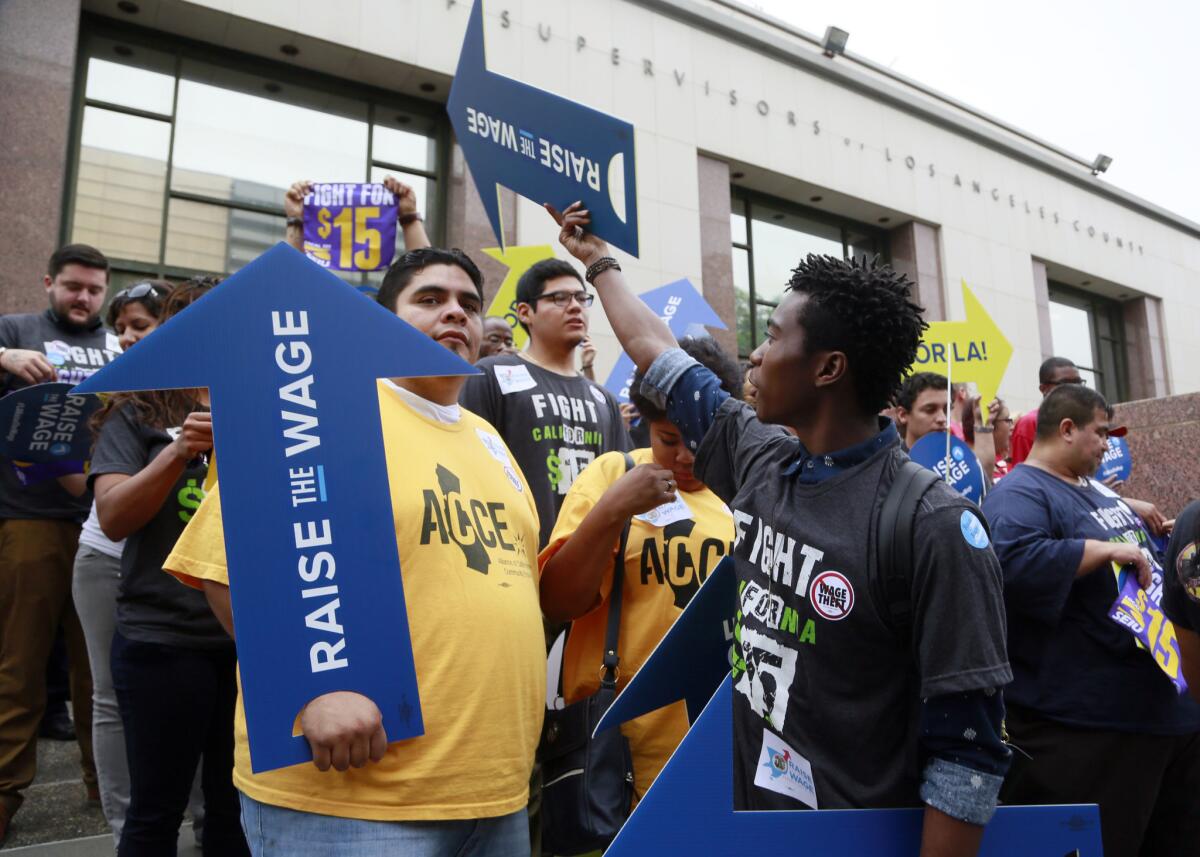County supervisors defeat attempt to add exemptions to $15 minimum wage

Workers hold a rally in support of the Los Angeles County Board of Supervisors’ proposed minimum wage ordinance in July.
Los Angeles County supervisors rejected a push to exempt nonprofits and job-training programs from a plan to increase the minimum wage for workers in county-controlled areas to $15 an hour by 2021.
The measure to increase the wage in unincorporated areas was first passed by a split vote in July. The board approved the final language of the plan by the same 3-2 vote Tuesday.
Conservative Supervisors Don Knabe and Michael D. Antonovich — who also opposed the wage increase — sought the last-minute exemptions for nonprofits, seasonal workers and workers in job-training programs such as Homeboy Industries.
Knabe proposed an exemption that would allow “transitional employment programs,” including Homeboy Industries and the Los Angeles Conservation Corps, to pay workers less than the new minimum wage during the first year and a half of employment. The proposal mirrors an exemption approved by the Los Angeles City Council after a similar wage increase plan was approved.
The training programs “create jobs for people who have to learn or relearn how to keep and maintain employment,” Knabe wrote, such as people coming out of jail or homelessness and at-risk youth. “I am concerned that if the county’s minimum wage ordinance is wholly applied to these programs, they might be forced to limit the number of program participants they serve.”
Antonovich proposed a broader exemption that would cover nonprofits with 25 or fewer employees. Without such an exemption, he argued, “Nonprofits may be forced to shrink the services they currently provide, reduce staffing, cut back hours of service, or in the worst case, they may have to close their doors permanently.”
He also proposed an exemption for seasonal employees, arguing that many are teenagers or young adults still living at home.
The proposals failed to gain traction with the other board members.
Supervisor Sheila Kuehl, who led the drive for an increased minimum wage, said she does not support exemptions for certain groups of workers. And she pointed out that the major transitional employment organizations are headquartered in the city of Los Angeles and have already been exempted by the council.
The minimum wage “is only one of the tools we will be using, hopefully, to bring our society back more into balance,” Kuehl said.
Supervisor Mark Ridley-Thomas said he also did not agree with setting a “different floor” for different groups.
“It begins to undercut the minimum wage, which is a basic element of trying to confront the issue of income inequality,” he said.
Supervisor Hilda Solis joined Kuehl and Ridley-Thomas in voting against the exemptions.
The county plan also does not include an exemption for unionized workers. A proposed union loophole in the city’s minimum wage plan remains an unresolved issue.
Business owners made a last-ditch attempt Tuesday to get the board to slow down implementation of the plan or exempt more businesses.
Low-wage workers and advocates for the higher wage praised the increase but urged the board to set up enforcement mechanisms to make sure employers actually pay the required wage.
The minimum wage plan will come back for a final vote next week.
Also Tuesday, the supervisors voted to:
Allow the Sheriff’s Department to collect victim restitution from convicted felons serving time in county jails by taking as much as 50% of the money deposited in inmate trust accounts by family members and others. Many victims have not been getting paid since a 2011 state law transferred responsibility for some nonviolent offenders from state prisons and parole to counties.
Set up a working group that will look at how young people fare after spending time in the county’s juvenile probation system and then develop a plan to improve services and keep them from getting in trouble again.
Take water conservation measures, including limiting washing of county cars to once a month and swapping out plumbing fixtures at county buildings for more efficient models, and possibly allow non-recreational grass at county facilities to go brown. They agreed to set up a revolving loan fund for water conservation projects by county departments.
abby.sewell@latimes.com
Follow Abby Sewell on Twitter at @sewella for more county news.
ALSO:
Owner of exotic cars speeding in Beverly Hills claims diplomatic immunity
Rain leads to river rescues, L.A. freeway shutdown, O.C. mud flows
Deadly Valley fire in Northern California grows to 67,000 acres; 15% contained
More to Read
Sign up for Essential California
The most important California stories and recommendations in your inbox every morning.
You may occasionally receive promotional content from the Los Angeles Times.











